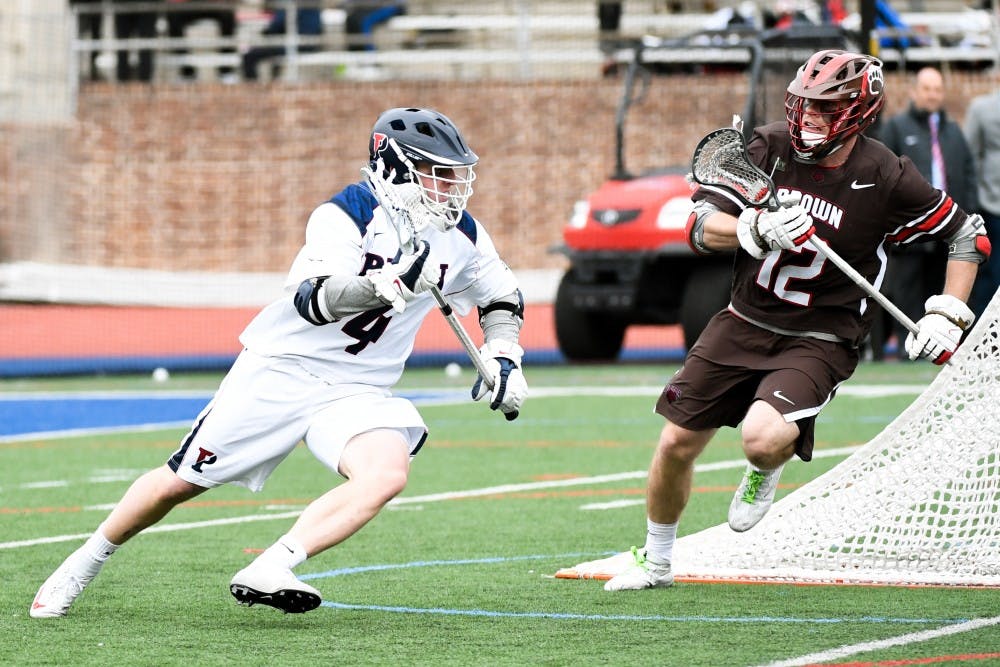
Senior midfielder Kevin McGeary led the Quakers with four points on the day against Brown, but it wasn’t enough to earn a win.
Credit: Chase SuttonTalk about a turn of events.
After starting off its season with an upset of then No. 1 Duke, Penn men's lacrosse is on the outside looking in to the Ivy League Tournament after a heartbreaking 10-9 loss to Brown.
The Bears (4-4, 1-1 Ivy) got off to a hot start, scoring three consecutive goals out of the gate. This quick deficit for the Quakers (5-5, 1-2) came out of a clear disadvantage during face-offs along with numerous tiny, but costly mistakes.
Tedd Ottens, the Brown face-off man, is ranked 24th in the nation for face-off winning percentage — whereas Penn doesn’t have a player within the top 50 — and his skill forced Penn to initially have a D-pole take the faceoff along with a long stick midfielder on the wing at the beginning of the game. Penn was clearly expecting to be on defense. However, this strategy proved fruitless, as the Bears were able to set up their offense, after winning the first face-off, and score.
“We were just trying to find somebody who could disrupt [Ottens],” coach Mike Murphy said.
In the second half, the strategy reverted to trusting Penn’s face-off man, Richie Lenskold, who managed to give Penn the advantage in the third quarter by one. This adjustment led Penn to cut Brown’s lead to only two heading into the fourth.
Penn’s scoring run was supported by improvements to their transition offense as well as hat tricks from attackmen Simon Mathias and Kevin McGeary. Long stick middie Connor Keating stepped up big time as the breakout man during transition opportunities, even managing to score the equalizing goal in the last quarter.
“[Offensive transition] is something we can build on for Harvard,” Murphy said.
However, despite the valiant efforts of the aforementioned players and the team as a whole in the second half, the hole that the Quakers found themselves in following the first half was too deep to overcome.
“Ultimately, we made so many mistakes in the first half that we cost ourselves the game that way,” Murphy said following the loss.
A large aspect of their shortcoming was penalties, the Quakers picking up five to the Bears’ one. Two of Brown’s early goals were achieved during man-up possessions, leading to more frustration, and more penalties.
Penn’s offense seemed to only get motivated once they found themselves already down by a fair margin, whereas, prior to Brown building up its lead, the Quakers had little off-ball movement. Murphy attributed the problematic spacing to Brown’s quick slides, yet this lack of activity led to many errant shots forced by the shot clock and even some shot clock violations.
On the defensive end, ground balls, despite being ultimately even in the box score, were hard to come by after good defense forced the ball out of Brown’s hands. Brown would then recover possession and, scoring or not, force Penn to exert more energy, hurting the defense in the long-run. Brown ended up netting the game-winning goal after two defenders, attempting to set up a double-team, got beat.
Given its dominant second half, Penn clearly has the talent and team chemistry to dismantle teams such as Brown, yet rampant mistakes and frustrated play have led to tough losses such as this one. Penn displayed similar issues in its loss at home against Cornell, where the Quakers turned the ball over more so than their opponent, accrued three penalties to none, and once again lost the face-off battle.
Penn will face its last two Ivy opponents, Harvard and Dartmouth — with St. Joe’s in between — over these next two weeks and will most likely have to win out in order to still be in playoff contention.
The little things really do count.
The Daily Pennsylvanian is an independent, student-run newspaper. Please consider making a donation to support the coverage that shapes the University. Your generosity ensures a future of strong journalism at Penn.
Donate






